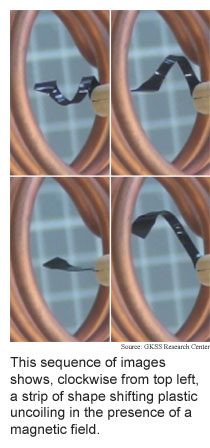
February
27, 2006
Magnetic
shape shifters
Transforming an object from one shape to another simply by heating
it, illuminating it, or exposing it to certain chemicals sounds like an
alchemist's dream, but it is a very real and very active area of research
for, among other things, making medical devices like stents.

Researchers from GKSS Research Center in Germany and the German
Institute for Polymers have expanded the possibilities for shape-memory
effect materials with a plastic that changes
shape when exposed to magnetic fields. The material can be formed
into a permanent shape when hot, then cooled and formed into a different,
temporary shape. Once the material is set up this way it can be switched
to its permanent state by exposing it to to an alternating magnetic field.
The material contains magnetic nanoparticles that heat up when
exposed to an alternating magnetic field. This heats the plastic above
the temperature needed relax it into its permanent shape.
This type of material is useful for making medical devices because
it is easy to trigger a shape change in the body using a magnetic field.
(Initiation of Shape-Memory Effect by Conductive Heating of Magnetic
Nanoparticles in Thermoplastic Polymers, Proceedings of the National
Academy Of Sciences, March 7, 2006)
Computing by not computing
Quantum computing is weird enough as it is, given the often counterintuitive
nature of quantum physics, but now scientists have demonstrated that it
is possible to get an answer from a quantum computer without actually
running the computer.
Researchers from the University of Illinois at Urbana-Champaign
have applied
the paradoxical quantum phenomenon of being able to measure something
by not measuring it to a quantum algorithm by not running it.
To do this, the researchers put the quantum computer in a superposition,
or mix, of two states: running and not running. From this superposition
the researchers were able to glean information about what would have happened
had the algorithm executed.
The quantum computer has to be on and configured to run the algorithm,
so there is no practical advantage to the technique. It is important,
however, because it could sidestep the problem of decoherence -- the destructive
effect of noise from the environment that is a major obstacle on the road
to practical quantum computers.
(Counterfactual Quantum Computation through Quantum Interrogation,
Nature, February 23, 2006)
Bits and pieces
Micro fuel cells get simple
A simple prototype microfluidic
fuel cell that does away with the usual membrane between the two electrodes
has operated for more than 100 days. The device pave the way for fuel
cells for portable devices.
(A Passive Microfluidic Hydrogen-Air Fuel Cell with Exceptional
Stability and High Performance, scheduled for publication in Lab on
a Chip)
Heart cells pump biochip
A small sheet
of heart cells beating in unison serves as the pump for a prototype
biochip. The heart cell pump needs no external power source. Biochips
make it possible to diagnose diseases and perform medical research using
small amounts of samples and without extensive laboratory equipment.
(An Actuated Pump on-Chip Powered by Cultured Cardiomyocytes,
scheduled for publication in Lab on a Chip)
Plastic cassette ID's DNA
A small, self-contained plastic
cassette amplifies and detects specific types of DNA. The inexpensive,
disposable device could be used for rapidly diagnosing diseases in hospitals
and clinics.
(A Disposable Microfluidic Cassette for DNA Amplification and
Detection, Lab on a Chip, January 2006)
Flat lens focuses microwaves
A left-handed material that bends electromagnetic waves makes
an inexpensive microwave
lens. The lens, made using printed circuit board manufacturing techniques,
could be used for telecommunications, including satellite links.
(Free-Space Microwave Focusing by a Negative-Index Gradient Lens,
Applied Physics Letters, February 20, 2006)
RSS Feeds: News Blog Books New: TRN's Internet Services TRN's Jobs Center News: Research News Roundup Research Watch blog Features: View from the High Ground Q&A How It Works Buy an ad link |
|
| Advertisements: |
|
Ad links: Clear History
Buy an ad link
|
TRN
Newswire and Headline Feeds for Web sites
|